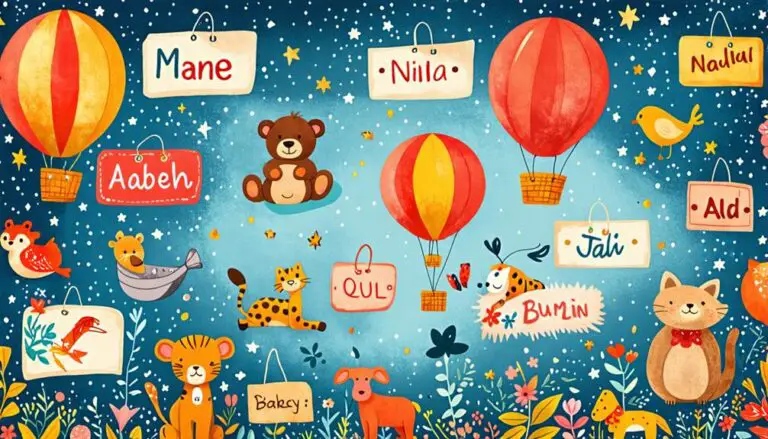Choosing a Baby Name That Works in Multiple Languages
Choosing a baby name that works in multiple languages can be a rewarding experience. It connects your child to their cultural roots and enhances their identity. Look for names that are easy to pronounce and don't carry negative meanings in any language. Some popular options include Nina, Adrian, and Max, which resonate in various cultures. It's also helpful to consult family members or use online resources for insights and advice. Selecting the right name shapes your child's self-perception and influences their interactions. Keep exploring to discover more about meaningful names that bridge cultures and languages seamlessly.
Importance of Bilingual Names

Choosing a bilingual name is important because it not only connects your child to their cultural roots but also supports their development in a multicultural world.
A bilingual baby name enhances their identity, allowing them to embrace and celebrate their heritage. It also aids language development, making it easier for your child to thrive in bilingual environments.
Additionally, a well-chosen name can bridge communication gaps in diverse settings, fostering connections with others. By selecting a bilingual name, you're encouraging appreciation for different cultures, which enriches your child's worldview.
This thoughtful choice can even influence social perceptions and open up future career opportunities in our increasingly globalized society, ensuring your child is well-prepared for whatever lies ahead.
Challenges in Name Selection
Selecting a name that resonates positively in multiple languages can pose significant challenges for parents. Balancing pronunciations and ensuring a baby name has no negative meanings in either language requires meticulous research. Here's a quick glance at some common considerations:
| Challenge | Description |
|---|---|
| Pronunciation Variations | Names may sound different, affecting identity. |
| Cultural Associations | Negative meanings can arise in specific contexts. |
| Family Expectations | Balancing traditions from both sides can be tricky. |
Additionally, you'll want to choose names that are easy to spell and pronounce, as this can prevent frustration for your child. Ultimately, considering how a name influences social perceptions and opportunities in a bilingual society is essential.
Popular Bilingual Names

Popular bilingual names offer a beautiful blend of cultural significance and versatility, appealing to families from diverse linguistic backgrounds.
Names like Camille, Olivier, and Émilie resonate in both English and French-speaking communities, showcasing their elegant meanings.
You might also consider names like Nina and Adrian, which are recognized across Spanish, Italian, and Romanian, making them excellent choices for multilingual families.
Samuel stands out for its cross-cultural appeal, fitting seamlessly into Hebrew, English, and various European languages.
Additionally, Max, a short form of Maximilian, serves as a popular gender-neutral option.
Resources for Name Selection
When you're exploring the world of baby names, various resources can help you find options that resonate across cultures.
BabyCenter Canada offers a vast database, detailing name meanings, origins, and popularity in different cultural contexts.
Online forums also provide a space for parents to share their experiences and seek advice about naming conventions in bilingual settings.
Consulting family members can give you valuable insights into names that honor your heritage.
Additionally, books and articles about naming conventions guide you in understanding the significance of names across cultures.
Impact of Name Choice

The name you choose for your baby can greatly shape their identity and how they're perceived in various cultural contexts.
Opting for a name that works across different languages not only eases integration into diverse environments but also opens doors to future career opportunities.
When you select a name that reflects your family's heritage, you foster a deep connection to cultural roots, enriching your child's sense of identity.
Additionally, this positive reinforcement of bilingualism from an early age enhances their linguistic and cultural development.
Ultimately, the right name can profoundly influence how your child relates to their background, shaping their self-perception and social interactions throughout their life.
Suggested Names Across Languages
Choosing a name that resonates across multiple languages can enhance your child's global identity and cultural connections. Here are some gorgeous names you might consider.
Nina is a lovely choice, recognized in Spanish, Italian, and Slavic languages, making it universally appealing.
Adrian works well in English, Spanish, and Romanian, reflecting its popularity across cultures.
For a shorter option, Max stands out as a friendly name recognized in various languages.
Oscar/Oskar holds its ground in English, German, and Scandinavian contexts, showcasing its cross-cultural charm.
Ultimately, Samuel is a versatile name found in Hebrew, English, and many European languages, highlighting its rich significance.
Each of these gorgeous names carries a unique blend of beauty and international flair.
Cultural Considerations in Naming

Considering the cultural significance of names is vital for parents looking to choose a name that resonates across languages. You'll want to select names that maintain their importance while being easily pronounced in different linguistic contexts. This approach enhances your child's identity and belonging.
Be mindful of names that might carry negative connotations or cultural appropriations, as these can affect social perceptions. Additionally, names with similar pronunciations across languages can help avoid confusion and miscommunication, fostering smoother interactions.
Balancing uniqueness with ease of use in multilingual settings is important, as it supports your child's integration into various cultural communities. Researching each name's background will guarantee it holds the desired significance in all languages.
Conclusion
Choosing a baby name that works in multiple languages can be rewarding and fun. It not only honors diverse cultures but also makes communication easier.
For instance, the name 'Luca' is popular in both Italian and Spanish, making it a great choice for parents in bilingual families.
By considering cultural nuances and linguistic harmony, you'll find a name that resonates across borders, setting a beautiful foundation for your child's identity in a globalized world.







